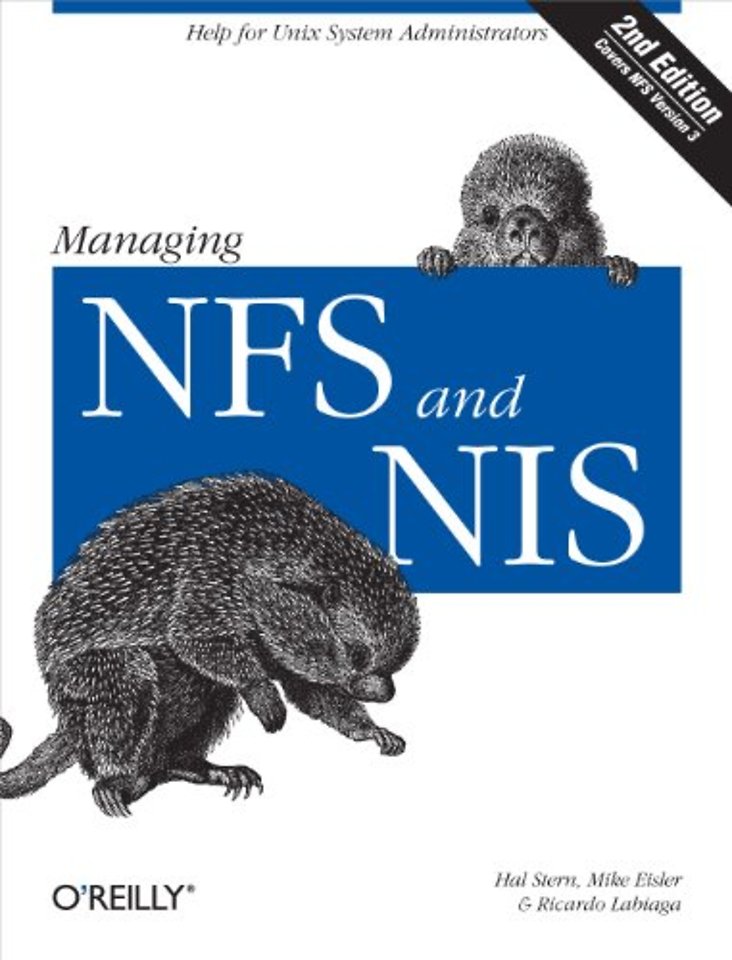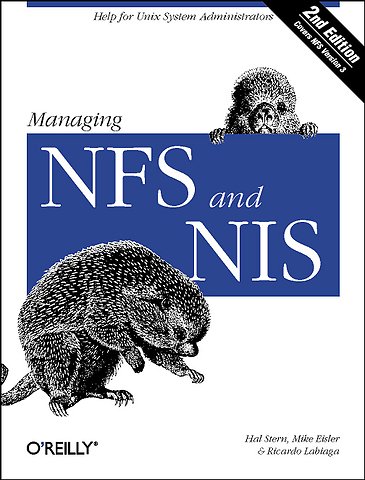


Hal Stern is a vice president at a technology company and uses WordPress to blog about his adventures in golf, ice hockey, and food.
Meer over de auteursManaging NFS and NIS 2nd edition
Covers NFS version 3
Samenvatting
A modern computer system that's not part of a network is even more of an anomaly today than it was when we published the first edition of this book in 1991. But however widespread networks have become, managing a network and getting it to perform well can still be a problem.
Managing NFS and NIS, in a new edition based on Solaris 8, is a guide to two tools that are absolutely essential to distributed computing environments: the Network Filesystem (NFS) and the Network Information System (formerly called the 'yellow pages' or YP).
The Network Filesystem, developed by Sun Microsystems, is fundamental to most Unix networks. It lets systems ranging from PCs and Unix workstations to large mainframes access each other's files transparently, and is the standard method for sharing files between different computer systems.
As popular as NFS is, it's a 'black box' for most users and administrators. Updated for NFS Version 3, Managing NFS and NIS offers detailed access to what's inside, including:
- How to plan, set up, and debug an NFS network
- Using the NFS automounter
- Diskless workstations
- PC/NFS
- A new transport protocol for NFS (TCP/IP)
- New security options (IPSec and Kerberos V5)
- Diagnostic tools and utilities
- NFS client and server tuning
NFS isn't really complete without its companion, NIS, a distributed database service for managing the most important administrative files, such as the passwd file and the hosts file. NIS centralizes administration of commonly replicated files, allowing a single change to the database rather than requiring changes on every system on the network.
If you are managing a network of Unix systems, or are thinking of setting up a Unix network, you can't afford to overlook this book
Specificaties
Inhoudsopgave
1. Networking Fundamentals
Networking overview
Physical and data link layers
Network layer
Transport layer
The session and presentation layers
2. Introduction to Directory Services
Purpose of directory services
Brief survey of common directory services
Name service switch
Which directory service to use
3. Network Information Service Operation
Masters, slaves, and clients
Basics of NIS management
Files managed under NIS
Trace of a key match
4. System Management Using NIS
NIS network design
Managing map files
Advanced NIS server administration
Managing multiple domains
5. Living with Multiple Directory Servers
Domain name servers
Implementation
Fully qualified and unqualified hostnames
Centralized versus distributed management
Migrating from NIS to DNS for host naming
What next?
6. System Administration Using the Network File System
Setting up NFS
Exporting filesystems
Mounting filesystems
Symbolic links
Replication
Naming schemes
7. Network File System Design and Operation
Virtual filesystems and virtual nodes
NFS protocol and implementation
NFS components
Caching
File locking
NFS futures
8. Diskless Clients
NFS support for diskless clients
Setting up a diskless client
Diskless client boot process
Managing client swap space
Changing a client's name
Troubleshooting
Configuration options
Brief introduction to JumpStart administration
Client/server ratios
9. The Automounter
Automounter maps
Invocation and the master map
Integration with NIS
Key and variable substitutions
Advanced map tricks
Side effects
10. PC/NFS Clients
PC/NFS today
Limitations of PC/NFS
Configuring PC/NFS
Common PC/NFS usage issues
Printer services
11. File Locking
What is file locking?
NFS and file locking
Troubleshooting locking problems
12. Network Security
User-oriented network security
How secure are NIS and NFS?
Password and NIS security
NFS security
Stronger security for NFS
Viruses
13. Network Diagnostic and Administrative Tools
Broadcast addresses
MAC and IP layer tools
Remote procedure call tools
NIS tools
Network analyzers
14. NFS Diagnostic Tools
NFS administration tools
NFS statistics
snoop
Publicly available diagnostics
Version 2 and Version 3 differences
NFS server logging
Time synchronization
15. Debugging Network Problems
Duplicate ARP replies
Renegade NIS server
Boot parameter confusion
Incorrect directory content caching
Incorrect mount point permissions
Asynchronous NFS error messages
16. Server-Side Performance Tuning
Characterization of NFS behavior
Measuring performance
Benchmarking
Identifying NFS performance bottlenecks
Server tuning
17. Network Performance Analysis
Network congestion and network interfaces
Network partitioning hardware
Network infrastructure
Impact of partitioning
Protocol filtering
18. Client-Side Performance Tuning
Slow server compensation
Soft mount issues
Adjusting for network reliability problems
NFS over wide-area networks
NFS async thread tuning
Attribute caching
Mount point constructions
Stale filehandles
A. IP Packet Routing
B. NFS Problem Diagnosis
C. Tunable Parameters
Index
Anderen die dit boek kochten, kochten ook
Net verschenen
Rubrieken
- aanbestedingsrecht
- aansprakelijkheids- en verzekeringsrecht
- accountancy
- algemeen juridisch
- arbeidsrecht
- bank- en effectenrecht
- bestuursrecht
- bouwrecht
- burgerlijk recht en procesrecht
- europees-internationaal recht
- fiscaal recht
- gezondheidsrecht
- insolventierecht
- intellectuele eigendom en ict-recht
- management
- mens en maatschappij
- milieu- en omgevingsrecht
- notarieel recht
- ondernemingsrecht
- pensioenrecht
- personen- en familierecht
- sociale zekerheidsrecht
- staatsrecht
- strafrecht en criminologie
- vastgoed- en huurrecht
- vreemdelingenrecht





